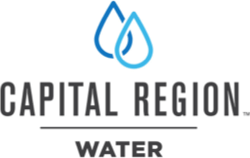Capital Region Water’s Chapter 94 Annual Wasteload Management Report for 2021 and Semi-Annual Report on Consent Decree Implementation is now available to access online. Section 4 of the report provides an assessment of the City Beautiful H2O Program and Capital Region Water’s wet weather compliance with Partial Consent Decree requirements.
Submission of the report is a regulatory requirement for Capital Region Water. It provides a performance summary of the Advanced Wastewater Treatment Facility (AWTF) that treats the wastewater of 130,000 residents in and nearby Harrisburg. The report also summarizes the condition of the systems which collect and convey stormwater and wastewater for treatment and serves to report on the progress Capital Region Water is making to reduce combined sewer overflow (CSO) events, which are a result of our outdated, aging infrastructure.
“In 2021, we met all requirements of the AWTF permit which allows CRW to discharge treated wastewater to the Susquehanna River,” said Capital Region Water CEO Charlotte Katzenmoyer. “Additionally, we fulfilled the requirements of the Partial Consent Decree under this reporting period from July 1 to December 31, 2021. This includes progress in developing and implementing maintenance and improvements programs and projects. But managing stormwater remains Capital Region Water’s biggest challenge.”
In 2015, Capital Region Water entered into a Partial Consent Decree with the Department of Justice (DOJ), United States Environmental Protection Agency (EPA), and the Pennsylvania Department of Environmental Protection (DEP) for the management of the combined, sanitary, and storm sewer systems, as well as the pumping stations and AWTF.
During dry weather or light rainfall events, both stormwater and wastewater go to the AWTF for treatment before clean water is released into the Susquehanna River. During moderate to heavy rainfall events, or due to pipe obstruction caused by debris or commercial fats, the combined system reaches capacity and a mixture of sewage and stormwater overflows into the Susquehanna River and/or Paxton Creek. These permitted combined sewer overflow (CSO) events are a symptom of CRW’s aged infrastructure, not an operational choice, and there is no easy solution or cheap fix to the problem. Harrisburg is one of nearly 860 communities nationwide managing a combined sewer system, including over 100 communities in Pennsylvania.
Capital Region Water captured and treated 87 percent of all combined sewage and stormwater in 2021 (by comparison, CRW captured and treated 92 percent in 2020), and on average treats 90 percent annually. The 13 percent that went untreated last year was primarily the result of heavy rains that overwhelmed Harrisburg’s aging and undersized infrastructure. Five of the largest 91 storm events that occurred in 2021 account for nearly 50 percent of the total CSO overflow volume for the year, including one such storm related to Hurricane Ida which exceeded the rainfall intensity associated with a 500-year storm event.
Other notable highlights of the 2021 Report include over 200 inspections under the Fats, Oils, and Grease Program, operation and maintenance enhancements to the street sweeping program, and completion of various capital improvements projects. Nine new rain gardens, four storage/infiltration trenches, and eight trees trenches for stormwater management have been added in Harrisburg. Upgrade to a major sewage pumping station, which replaced failing mechanical equipment and increased pumping capacity by 50 percent to increase CSO capture, was also completed.
Capital Region Water continues to meet with regulatory oversight agencies to discuss a modification to the Partial Consent Decree, including a 10-year project list which when completed will ensure compliance with the USEPA capture threshold for all wet weather discharge. Additional capital projects planned for 2022 include rehabilitation to the sewage conveyance systems, specifically the Front Street Interceptor, which was originally constructed in 1911, and two new green stormwater infrastructure systems in the Camp Curtin and Bellevue Park neighborhoods.
Since its inception in 2013, Capital Region Water has invested more than $170 million to improve our water and wastewater infrastructure, address a backlog of deferred maintenance projects that stretches back decades, and collaborate with ratepayers and stakeholders to meet our most pressing local needs while fulfilling state and federal clean water requirements.
City Beautiful H2O is Capital Region Water’s integrated planning program to address system-wide infrastructure deterioration and restore and beautify our neighborhoods through community greening. We are investing millions of dollars to repair aging infrastructure, reduce combined sewer overflows, control backups onto streets and into basements to improve the quality of local waterways, and protect public health and safety. An additional $200 million in investment in our wastewater and stormwater systems is expected over the next two decades.
To learn more, please visit https://capitalregionwater.com/what-we-do/cbh2o/. Customers with specific questions can contact Capital Region Water’s at 888-510-0606 or via email at info@capitalregionwater.com.
